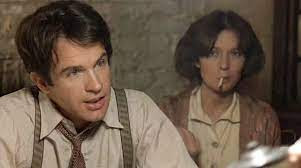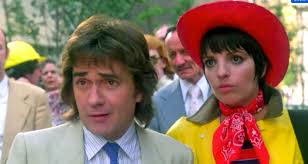Jernmanden
Andrzej
Wajda’s “Man of Iron” (“Czlowiek z zelaza”) is a movie that is more interesting
than good. It is a movie that drags and confuses, yes is enormously relevant
and important.
Back in the
eighties, the Polish “Solidarity” (“Solidarnosc”) movement was continuously a big
story in the news media and Lech Walesa was a household name. If you could only
name one Pole, it would likely be him. Denmark is close to Poland and although
on the other side of the Iron Curtain, what happened there felt very important.
“Man of Iron” sets out to tell that story, or rather the story as it was formed
by 1981 when “Solidarity” seemed to have finally won concessions and
recognition from the Polish communist government.
“Man of
Iron” is however not a story about Lech Walesa, but of a proxy character,
sharing many of the character features of the famous Walesa. This character is
Maciek Tomczyk (Jerzy Radziwiłowicz), the son of Mateusz Birkut. And yes, if
that rings familiar, it is because “Man of Iron” serves as a continuation of
Wajda’s earlier movie “Man of Marble”. In that we learned that Birkut ended up
at a shipyard near Gdansk and the film journalist Agnieszka (Krystyna Janda)
found his son there. In “Man of Iron” the observer is no longer Agnieszka, but
a radio journalist, Winkel (Marian Opania), who usually do government scripted
radio pieces. He is sent to Gdansk by the authorities with the assignment to create
a smear piece on Tomczyk. To that end, he is introduced to various people acquainted
with Tomczyk who can tell his story from the late sixties to the present day.
These are his student friend, Dzidek (Boguslaw Linda), Tomzcyk’s grandmother
(?) and finally Agnieszka, who is herself in prison now.
Each story
is told in flashback: how the students were beaten up in 68, how Birkut was
killed in the strike in 70 and how, in the late seventies, Tomzcyk was arrested
as a troublemaker and barred from the shipyard. All parts that mirror the story
of Walesa himself. Winkel is a nervous guy, caught between the police state and
the just cause, he is supposed to sabotage. The opposite pulls take a toll on
him so when he finally takes side, it is a great relief for him, the feeling of
freedom.
It is rare
that a filmmaker catches a moment as it happens as well as Wajda does here. He
is literally telling a story of history in the making. The movie includes clips
from the actual strikes in both 1970 and 1980 with the actual Lech Walesa and
the signing of the agreement with the government. It even includes the
prophetic warning from the Party official in the closing moments, that the
agreement is just a piece of paper. Shortly after the movie was released, the Polish
government rolled back the agreement, outlawed “Solidary” and banned Wajda’s
movie. Lech Walesa and “Solidarity” did not give up but were instrumental in
the fall of communism less than a decade later and Walesa became the first
democratically elected president of Poland since the Second World War.
One of the
details that come through very clearly in the movie is that the strike slogans
and demands are socialist at heart. This is a socialist rebellion against a socialist
government, who cannot crack down on the strike without going up against its
own stated policy. By doing so, it reveals itself as being the less socialist
of the two, a simple police state. Therefore, this is most of all a fight over
the narrative and the journalist is the foot soldier in that war. Wajda was extremely
perceptive there.
What works
less good for me as an outside viewer is the confusion of people, places and
functions as well as the many references to past events. Elements that would
make perfect sense to a contemporary Polish viewer, but had the effect on me to
lose the thread several times. Add to that, that it seems as if we get the same
story told several times without learning that much new and it feels like an
unnecessarily long movie. Finally, every time the movie delves into the actual
politics, we get a lot of socialist dialectics which is just so much
mumbo-jumbo, talk with very little apparent content that I am left in some
confusion on what the conflict was really about.
Thus, the
odd combination of interesting but not great.
In 2016 I
was in Gdansk for a conference on noise from wind turbines which took place at
the “European Solidarity Center” (“Europejskie Centrum Solidarnosci”), the
imposing and impressive exhibition and conference center commemorating these
very events. Humbling and evocative.






